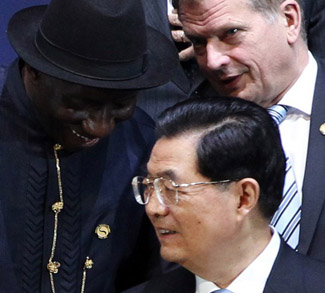Summary
Despite its accusations of “genocide” in Darfur and an outbreak of violence in oil-rich Abyei, the US is negotiating with Sudan to normalize diplomatic relations. Washington says its aim is to broker peace in Darfur, however what lies at stake are investment opportunities in Sudan’s oil sector as well as Sudan’s continued cooperation with the CIA on counter-terrorism measures in the region.
Analysis
US President George W. Bush has long accused Sudanese President Omar Hassan al-Bashir of “genocide” in Darfur, however US Special Envoy Richard Williamson’s visit to Khartoum this week follows a series of private meetings between senior Bush administration officials and the Sudanese president to normalize US-Sudan relations before President Bush leaves office in January 2009.
Although these activities run counter to Bush’s recent statement that diplomacy with tyrants and dictators is tantamount to appeasement, thus underscoring Washington’s hypocrisy, Washington claims that it only seeks to end the violence in Darfur, one of its conditions for rapprochement. However, economic and security trends indicate that Washington’s underlying aim is to enable investment opportunities in Sudan’s oil sector and secure Sudan’s continued cooperation with the CIA in its ongoing “war on terror”.
Sudan’s oil reserves of 6.4 billion barrels (and daily output of 500,000 barrels), which is the crux of the conflict between Khartoum and the South, are one of the largest in Africa and have attracted billions of dollars in investment from a number of countries, including China, India, Malaysia, France, and England. But the US, which is the largest oil importer in the world, has been locked out of Sudan’s lucrative sector since Washington’s 1997 blacklisting of the country as a state sponsor of terrorism because of its links to Osama bin Laden.
Unable to wrangle control of Sudan’s oil reserves under the pretext of proposed “peacekeeping” initiatives, the lifting of economic sanctions would prove easier and allow the US to reduce its dependency on Middle Eastern oil while countering competition from China and other countries. US corporations and investors would also gain access to Sudan’s large deposits of natural gas, high-purity uranium, and copper.
Also at stake is Sudan’s ongoing alliance with the CIA in the “war on terror”. After 9/11, the largely Sunni Arab Sudan became increasingly important as a crossroads for Islamic militants traveling to Iraq and Pakistan. As a result, the Bush administration shifted from the previous US policy of isolating Sudan in order to quietly re-establish ties with Sudan’s Mukhabarat intelligence service headed by Major General Salah Abdallah Gosh. Notorious for human rights violations, accused by US congress members of committing war crimes in Darfur, and in regular contact with Osama bin Laden prior to 9/11, Gosh is now the darling of the US intelligence community on account of his intel on the Iraq insurgency, his capture, detainment, and extradition of suspected terrorists operatives to the West, and his disruption of “terrorist” activities in Sudan and Somalia.
With the CIA currently building its biggest operations center in Sudan and AFRICOM set to become fully operational this fall, normalized relations would secure Sudan’s cooperation and bolster regional counter-terrorism initiatives. Rapprochement with Sudan would also fall in line with Bush’s wider Middle East policy of backing Sunni governments and even extremist groups as a bulwark against Iran and the Shiite majority in Iraq.
In light of Khartoum’s failure to implement previous peace agreements, as evidenced by ongoing violence in Darfur and the recent outbreak of violence in Abyei, news of normalization talks has been met with widespread criticism from US and South Sudanese officials as well as Darfur advocates. But with oil and the “war on terror” at stake, Washington is likely to continue negotiating rapprochement with Sudan at the expense of human rights.
History
The largest country in Africa, Sudan has been wracked by civil war for much of the late 20th century. The Second Civil War, a continuation of the First (1955-1972) started in 1983 between the Sunni Arab government in the north and the non-Arabic Sudan People’s Liberation Army (SPLA) in the south over control of southern Sudan’s oil fields discovered in 1978, among other issues.
Two million deaths later, the civil war ended in 2005 with the signing of a Comprehensive Peace Agreement (CPA), which the US helped negotiate. The CPA granted southern Sudan autonomy for six years followed by a referendum on secession, listed a protocol for democratic governance, and established the joint sharing of oil revenue.
Yet by then, conflict had broken out in the western region of Darfur when rebels took up arms against government oppression of non-Arabs. Government backed militias retaliated with a scorched earth policy at the expense of 400,000 civilian lives—which the US called a genocide—and the displacement of millions which facilitated government controlled oil extraction in the region. Scorched earth policies are also occurring in oil-rich Abyei, a contested region straddling North and South Sudan that is set to vote in the 2011 secession referendum. Sudan is now on the brink of another civil war.
Marsha Reid is a contributor to Geopoliticalmonitor.com



